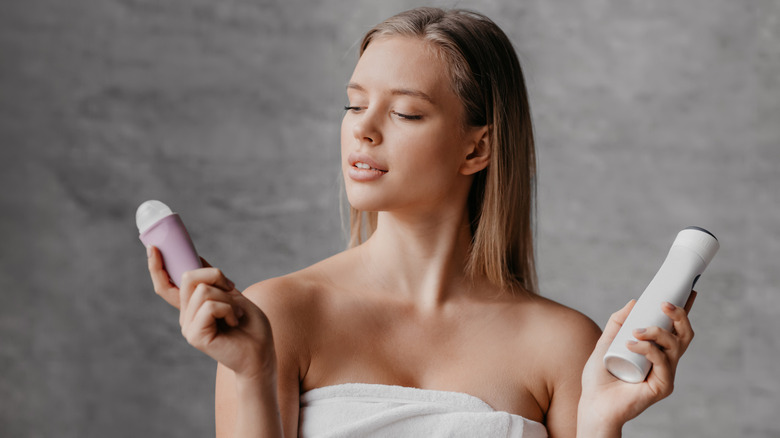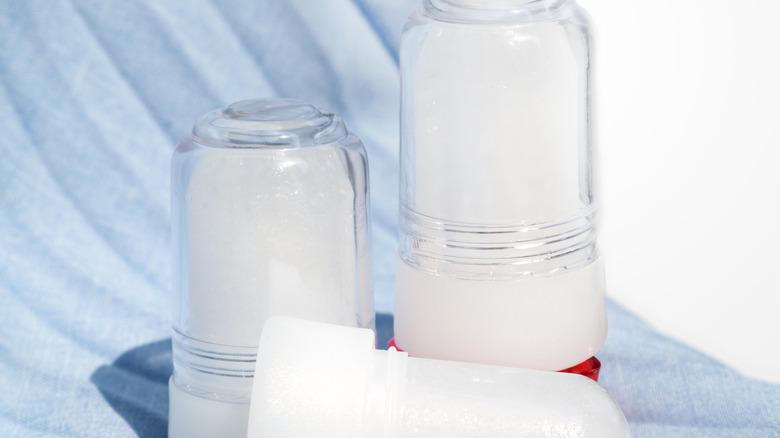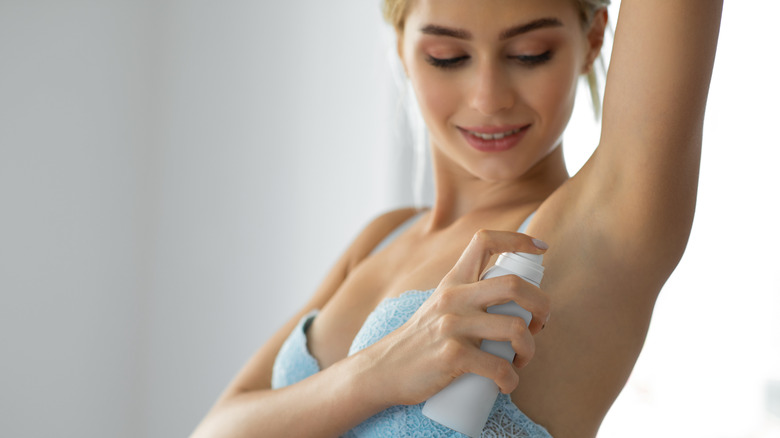Do We Really Need To Be Concerned About Aluminum In Deodorant? It's Complicated
For the most part, we don't really give our deodorants a second thought as long as they're doing their job. We swipe them across our underarms every day with the expectation that they will block out the funk, and if yours doubles as an antiperspirant, you also trust it not to give you any embarrassing pit stains. Swipe, rinse, repeat.
In recent years, however, there's been much ado about natural deodorants, with a slew of brands releasing options that have "aluminum-free" as their key selling point. If you look at the messaging across their marketing closely, these brands are subtly suggesting that natural deodorants are the "safer" choice and that traditional deodorants have ingredients, particularly aluminum, that can pose a risk to one's health (more on this later).
If you don't know any better, you'll be inclined to succumb to these claims and ditch deodorants that work for you or what your body has grown accustomed to. But is there really any truth to these assertions? Or are they just exaggerated claims to get you to jump ship and take your money elsewhere? How harmful is aluminum, really?
What's the deal with aluminum?
Despite what the aforementioned marketing implies, deodorants have zero aluminum content. It's actually antiperspirants that are formulated with aluminum, and the only time your deodorant will have aluminum in it is if it's also developed to make you sweat less. Dr. Alicia Zalka, a board-certified dermatologist and assistant clinical professor of dermatology at Yale School of Medicine, explained to Byrdie that when aluminum comes in contact with sweat, it "creates a gel-like substance that plugs up sweat ducts in the skin, thus temporarily blocking the ability of sweat to reach the skin surface."
Now aluminum can be toxic if you're exposed to high concentrations of it, and there are some studies that link aluminum exposure to developing serious diseases like Alzheimer's and breast cancer. As a result, aluminum became a pressing issue for people using products with the ingredient in them, but the Alzheimer's Drug Discovery Foundation noted that there's no solid evidence that proves that using aluminum-containing antiperspirants can make you more susceptible to dementia. Likewise, the American Cancer Society also confirmed that there's no need to feel alarmed, as studies associating breast cancer development with antiperspirant usage are inconclusive.
If you have kidney problems, however, it's a whole different story. Physician Dr. Benjamin Chan of Penn Medicine explained that if your kidney function is significantly diminished, it "can't filter aluminum fast enough," so more aluminum will likely enter your circulation. But if your kidneys are healthy, they'll be able to "process the amount of aluminum from antiperspirants and cosmetics that is absorbed through your skin," he said.
How to pick a deodorant that's right for you
With all these in mind, it's also understandable that you still want to exercise caution and avoid aluminum products completely, in which case, going for those natural deodorants may be ideal. Sweating is good for you, after all, so some moisture in your pits may not be so bad.
Then again, the good news is there is a handful of natural deodorants with drying properties that sponge up wetness instead of block sweat. Dermatologist Dr. Marisa Garshick, an assistant professor of dermatology at Cornell, told The Strategist that aluminum alternatives like aloe and vegetable glycerine typically do a great job of keeping you dry. "The vegetable glycerin can help to absorb excess moisture, so while it is not acting as an antiperspirant and does not prevent the formation of sweat, it can help to absorb moisture, minimizing the feeling of wetness," she said.
On the flip side, if you want to continue using products with aluminum to say goodbye to sweat altogether, that should be fine, too. Your body has other ways of flushing it out, anyway. "Our body also produces urea, which is the nitrogen byproduct of protein metabolism," Dr. Hooman Khorasani, an assistant professor of dermatology at the Icahn School of Medicine at Mount Sinai, explained to The New York Times. "Luckily, the sweat glands are not the only way of eliminating urea, as the kidneys do most of the elimination. Therefore, there is not a significant buildup of biological waste with the use of antiperspirants."


